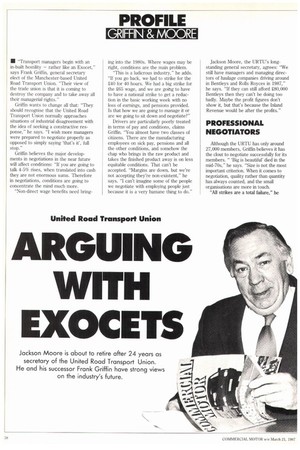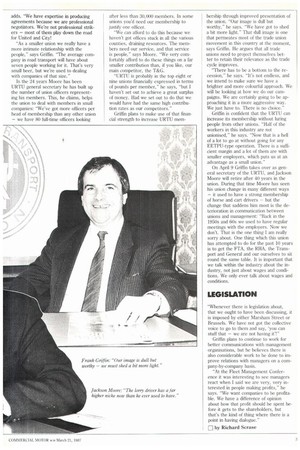ARGUING WITH EXOCETS
Page 40

Page 41

If you've noticed an error in this article please click here to report it so we can fix it.
Jackson Moore is about to retire after 24 years as secretary of the United Road Transport Union. He and his successor Frank Griffin have strong views on the industry's future.
• "Transport managers begin with an in-built hostility — rather like an Exocet," says Frank Griffin, general secretary elect of the Manchester-based United Road Transport Union. "Their view of the trade union is that it is coming to destroy the company and to take away all their managerial rights."
Griffin wants to change all that: "They should recognise that the United Road Transport Union normally approaches situations of industrial disagreement with the idea of seeking a constructive response," he says. "I wish more managers were prepared to negotiate properly as opposed to simply saying 'that's it', full stop."
Griffin believes the major developments in negotiations in the near future will affect conditions: "If you are going to talk 4-5% rises, when translated into cash they are not enormous sums. Therefore in negotiations, conditions are going to concentrate the mind much more.
"Non-direct wage benefits need bring ing into the 1980s. Where wages may be right, conditions are the main problem.
"This is a ludicrous industry," he adds. "If you go back, we had to strike for the for 40 hours. We had a big strike for the £65 wage, and we are going to have to have a national strike to get a reduction in the basic working week with no loss of earnings, and pensions provided. Is that how we are going to manage it or are we going to sit down and negotiate?"
Drivers are particularly poorly treated in terms of pay and conditions, claims Griffin, "You almost have two classes of citizens. There are the manufacturing employees on sick pay, pensions and all the other conditions, and somehow the chap who brings in the raw product and takes the finished product away is on less equitable conditions. That can't be accepted. "Margins are down, but we're not accepting they're non-existent," he says. "I can't imagine some of the people we negotiate with employing people just because it is a very humane thing to do." Jackson Moore, the URTU's longstanding general secretary, agrees: "We still have managers and managing directors of haulage companies driving around in Bentleys and Rolls Royces in 1987," he says. "If they can still afford 280,000 Bentleys then they can't be doing too badly. Maybe the profit figures don't show it, but that's because the Inland Revenue would be after the profits."
PROFESSIONAL NEGOTIATORS
Although the URTU has only around 27,000 members, Griffin believes it has the clout to negotiate successfully for its members. " 'Big is beautiful' died in the mid-70s," he says. "Size is not the most important criterion. When it comes to negotiation, quality rather than quantity has always counted, and the small organisations are more in touch.
"All strikes are a total failure," he
adds. "We have expertise in producing agreements because we are professional negotiators. We're not professional strikers — most of them play down the road for United and City!
"As a smaller union we really have a more intimate relationship with the people," says Griffin. "The average company in road transport will have about seven people working for it. That's very small beer, but we're used to dealing with companies of that size."
In the 24 years Moore has been URTU general secretary he has built up the number of union officers representing his members. This, he claims, helps the union to deal with members in small companies: "We've got more officers per head of membership than any other union — we have 80 full-time officers looking after less than 30,000 members. In some unions you'd need our membership to justify one officer.
"We can afford to do this because we haven't got offices stuck in all the various counties, draining resources. The members need our service, and that service is people," says Moore. "We very comfortably afford to do these things on a far smaller contribution than, if you like, our main competitor, the T&G.
"URTU is probably in the top eight or nine unions financially expressed in terms of pounds per member," he says, "but I haven't set out to achieve a great surplus of money. Had we set out to do that we would have had the same high contribution rates as our competitors."
Griffin plans to make use of that financial strength to increase URTU mem bership through improved presentation of the union. "Our image is dull but worthy," he says. "We have got to shed a bit more light." That dull image is one that permeates most of the trade union movement in this country at the moment, says Griffin. He argues that all trade unions need to project themselves better to retain their relevance as the trade cycle improves.
"There has to be a bottom to the recession," he says. "It's not endless, and we intend to make sure we have a brighter and more colourful approach. We will be looking at how we do our campaigns. We are certainly going to be approaching it in a more aggressive way. We just have to. There is no choice."
Griffin is confident that the URTU can increase its membership without luring people from other unions. "Half of the workers in this industry are not unionised," he says. "Now that is a hell of a lot to go at without going for any EETPU-type operation. There is a sufficient margin and a lot of them are with smaller employers, which puts us at an advantage as a small union."
On April 9 Griffin takes over as general secretary of the URTU, and Jackson Moore will retire after 40 years in the union. During that time Moore has seen his union change in many different ways — it used to have a strong membership of horse and cart drivers — but the change that saddens him most is the deterioration in communication between unions and management: "Back in the 1950s and 60s we used to have regular meetings with the employers. Now we don't. That is the one thing I am really sorry about. One thing which this union has attempted to do for the past 10 years is to get the PTA, the RHA, the Transport and General and our ourselves to sit round the same table. It is important that we talk within the industry about the industry, not just about wages and conditions. We only ever talk about wages and conditions.
LEGISLATION
"Whenever there is legislation about, that we ought to have been discussing, it is imposed by either Marsham Street or Brussels. We have not got the collective voice to go to them and say. 'you can stuff that — we are not having it'!"
Griffin plans to continue to work for better communications with management organisations, but he believes there is also considerable work to be done to improve relations with managers on a company-by-company basis.
"At the Fleet Management Conference it was interesting to see managers react when I said we are very, very interested in people making profits," he says. "We want companies to be profitable. We have a difference of opinion about how that profit should be spent before it gets to the shareholders, but that's the kind of thing where there is a point in having dialogue."
11 by Richard Scrase




















































































